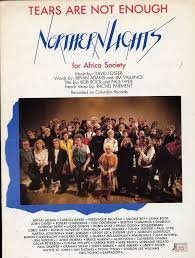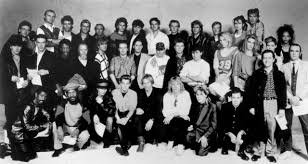1984-85: The era of Musical Humanitarianism
I have stated elsewhere that the state of society impacts greatly on music and music serves as a reflective mechanism of society. When we sing about love and the need for compassion, it is always borne out of the fact that society is bereft of these values. Consequently, musical humanitarianism pushes the need for inner reflection and humanity in our dealings with fellow men. It is a reminder that steers groundedness and consciousness of human interconnectivity and the fact that what affects one, affects all.
When any section of the world population suffers famine, earthquake, drought, artificially masterminded retrogression, impoverishment, war, etc, we all suffer collectively, period. When politicians inflict hardship upon the people through their callous policies or political insensitivity, while they may laugh and merry because of their access to the collective wealth which excludes the citizens, they inevitably undergo a boomerang effect which signals the universal law of cause and effect. So, I repeat, what affects one affects all, be it good or bad.
In the course of popular music history, many songs have been sung to uphold humanity and champion the cause of charity towards the indigent. The years 1984 and 1985 were most significant due to the emergence of three musical groups from the US, Canada and UK, respectively, towards a single cause which was fundraising towards the alleviation of the famine in Ethiopia which lasted between 1983 - 1985. The disaster was attributed to drought and war, and led to a high mortality rate with about 1,2 million dead.
With the recent transition of Quincy Jones, the music maestro extraordinaire or The Soul Bossa Nostra on the 4th of November, one is reminded of one of the most profound and quintessential charity songs produced by him.
The song “We are the World” https://www.youtube.com/watch?v=9AjkUyX0rVw was performed under the musical umbrella USA for Africa. It was written by Michael Jackson and Lionel Richie, two outstanding music icons of the 1980s and further orchestrated and produced by Q.
This song is special to me, as an elder Millennial, as it was the first song that I could internalize and sing verbatim. With a recognizable intro, it is endowed with some of the best and mediocre voices on the 1980s American music landscape. The best voices would be Lionel Richie, Stevie Wonder, Kenny Rogers, Diana Ross, Dionne Warwick, Tina Turner, James Ingram, Ray Charles, Cyndi Lauper, Billy Joel, Willie Nelson, Al Jarreau, Kenny Loggins, Steve Perry, etc.
Bruce Springsteen’s vocals are a melange of adjectives: impressive,mediocre, forced, steely, perhaps due to the style of delivery. His abrasive vocal tonality soothes perfectly the rock genre which he represents. In this case, his raspiness compliments and bounces off nicely against the luminousity of Stevie Wonder.
However, the worst voice on the line-up would be Bob Dylan’s. Of course, the eminent musician has inspired popular culture and is known for his song writing prowess, one being the familiar “Blowin’ in the Wind”. But, as far as singing goes, No Siree!
While pondering about the rational for his inclusion in the vocal line-up, I did reach the conclusion based on the observation that in this patriarchal existence with its in-built racism, indegenous people require white patronage for every endeavour, should they covet mobility, success and recognition. In essence, this song was crafted by indegenous people and ideally could have been executed excellently with indegenous voices. But, since the world currently runs on the direction of white men who are most times unqualified leaders, but somewhat are powerbrokers and music proprietors operating a slave-based music industry, the presence of whiteness is required to gain a stamp of approval. It is like watching Black Panther 1 and pondering about the significance of whiteness in an indegenous story. Many successful white stories have been told without the visibility of blackness in them, but somehow, the indegenous stories always need the pervasive presence and endorsement of the other to gain some legitimacy.
Dylan could have registered his presence in the background choir which contained other recognizable voices like Sheila E, The Pointer Sisters, Harry Belafonte, Bettie Midler, Jeffrey Osbourne, The Jacksons (La Toya, Jackie, Marlon, Tito and Randy) . But I suppose, the vocal line-up was a marker of distinction in the field. Just a thought!
My favourite moments are the duet between Stevie Wonder and Bruce Springsteen, the paternal style of Ray Charles, the brashness of Cyndi Lauper, the accelerated delivery of James Ingram towards the end and the unforgettable celestiality of Michael Jackson. This song remains relevant because since then, the world is yet to reach a state of utopia.
At about the same time, musicians in Canada also assembled under the aegis of Northern Lights to express their musical goodwill towards the Ethiopians in the song “Tears are not Enough” https://www.youtube.com/watch?v=o6OqvHNcuTk , which was produced by David Foster, who also wrote “I have nothing” for Whitney Houston.
Often underrated, as you would expect, afterall the USA gets to shove her enterprise and shenanigans in our faces all the time to the detriment of others, the song showcases the musical icons on the Canadian landscape like Gordon Lightfoot, Burton Cummings, Anne Murray, Joni Mitchell, Dan Hill, Neil Young, Bryan Adams, Mike Reno, Liberty Silver, Carroll Baker, Ronnie Hawkins, Murray McLauchlan, Corey Hart, Véronique Béliveau, Robert Charlebois and Claude Dubois (sing in French), Bruce Cockburn, Geddy Lee , Adams and Don Gerrard, Alfie Zappacosta and Lisa Dalbello, Carole Pope (Rough Trade) and Paul Hyde, Salome Bey, Mark Holmes, Lorraine Segato, and Mike Reno.
All but Bryan Adams are unknown on the global scale. Nonetheless, the Canadian rendition is weightier, solemn and sublime. The lyrics are provocative and bittersweet. “Tears are not enough” literally opens the portal of tears and allows an outpour while reflecting on the state of the earth and humanity. What it lacks in star quality, is compensated by a remarkable simplicity and profundity which surpasses its US counterpart. The group composition just like the US demonstrates a symmetric balance in female and male representation and recognizes Canada’s linguistic diversity, albeit with just a line in French.
On the other hand, Band Aid which catalyzed the emergence of the previously mentioned groups , in view of its creation in 1984, under the direction of Bob Geldof and Midge Ure for the same cause and comprised mainly of English and Irish male recording artists pales in comparison. The charity song title “Do they know its Christmas?” https://www.youtube.com/watch?v=RH-xd5bPKTA , and its entire essence is bereft of sensitivity to the cause, performative and downright disrespectful. Why should they know if its Christmas? What do you Mr Singer know about them? Although I appreciate Boy George as a dynamic music icon, but his line which says “In a world of plenty, we can spread a smile of joy” reminds me of the paternalism and scarcity programming of white patriarchy where the oppressor plays the role of the benevolent saviour, master and redeemer, despite being the root cause of the problem, in the first place. The only applaudable components for me are the energetic and catchy melody of the song and its temporal acceleration. As well as the beautiful singing of Paul Young, Boy George and George Michael.
However, the group’s composition indicates all that is wrong with the world, the paucity of female voices (where were Annie Lennox, Bonnie Tyler, Grace Jones, Sade or Sheena Easton) on the line up and just a few female faces in the entire background. It showcases the prominent male singers from Empires’ kingdom like George Michael, Bono, Boy George, Sting, Phil Collins, Paul Young, etc. It features appearances by the American artistes, Jody Watley who was on a hiatus in England after her departure from the band, Shalamar in 1983; and some members of Kool and the Gang (James “JT” Taylor and Robert “Kool” Bell), who were probably on tour.
In conclusion, while USA for Africa embodied glamour, razzmatazz and overperformance, and Northern Lights adorned simplicity standing as a beacon of light, Band Aid wreaked of arrogance. The first stands prominently as the best known charity song. The second is hardly known, probably because Canada was colonized by the French and English, while the third enjoys airplay in Europe, especially in Germany during Christmas. By reason of proximity, the Germans prefer Band Aid to USA for Africa.
Famines and wars have come and gone. Some are still brewed and speculated about, as I write. While humanity steadily devolves, empathy and kindness continually decline. Man’s inhumanity to fellow man thrives and is celebrated. It is a shame what the world has become.
Nonetheless, I remain optimistic just like Sam Cooke once sang that “A change is gonna come”. I hope SOON!




